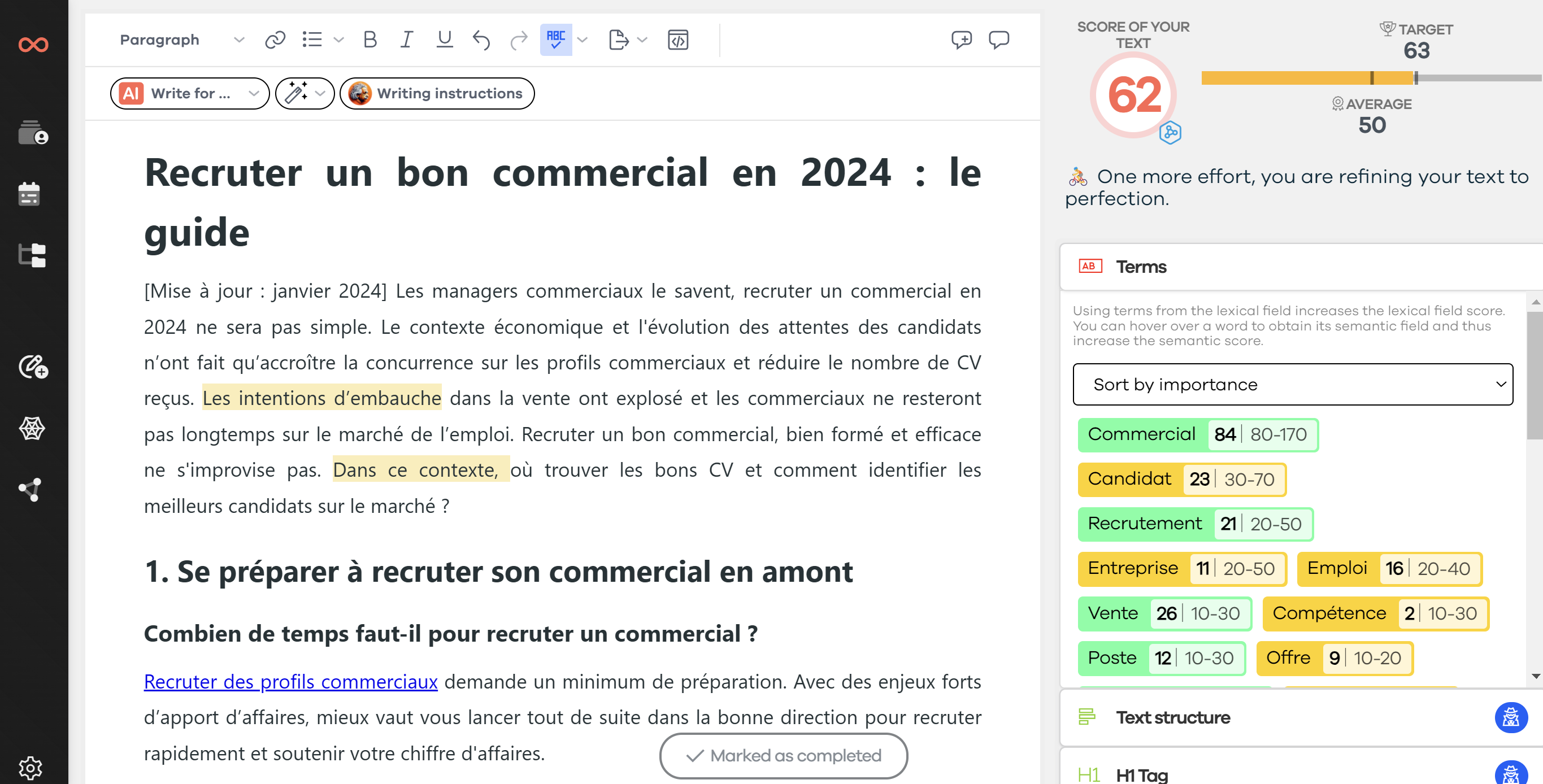Writing quality content takes time and energy. And what a disappointment when no one reads it! Just like you, I've found myself in this situation. But with experience, I've found ways to know if my text is SEO optimized. Because let's not kid ourselves, if we don't write with the goal of improving our search engine ranking, our content will likely remain invisible forever.
🚀 Quick read: one minute to know if my text is SEO optimized
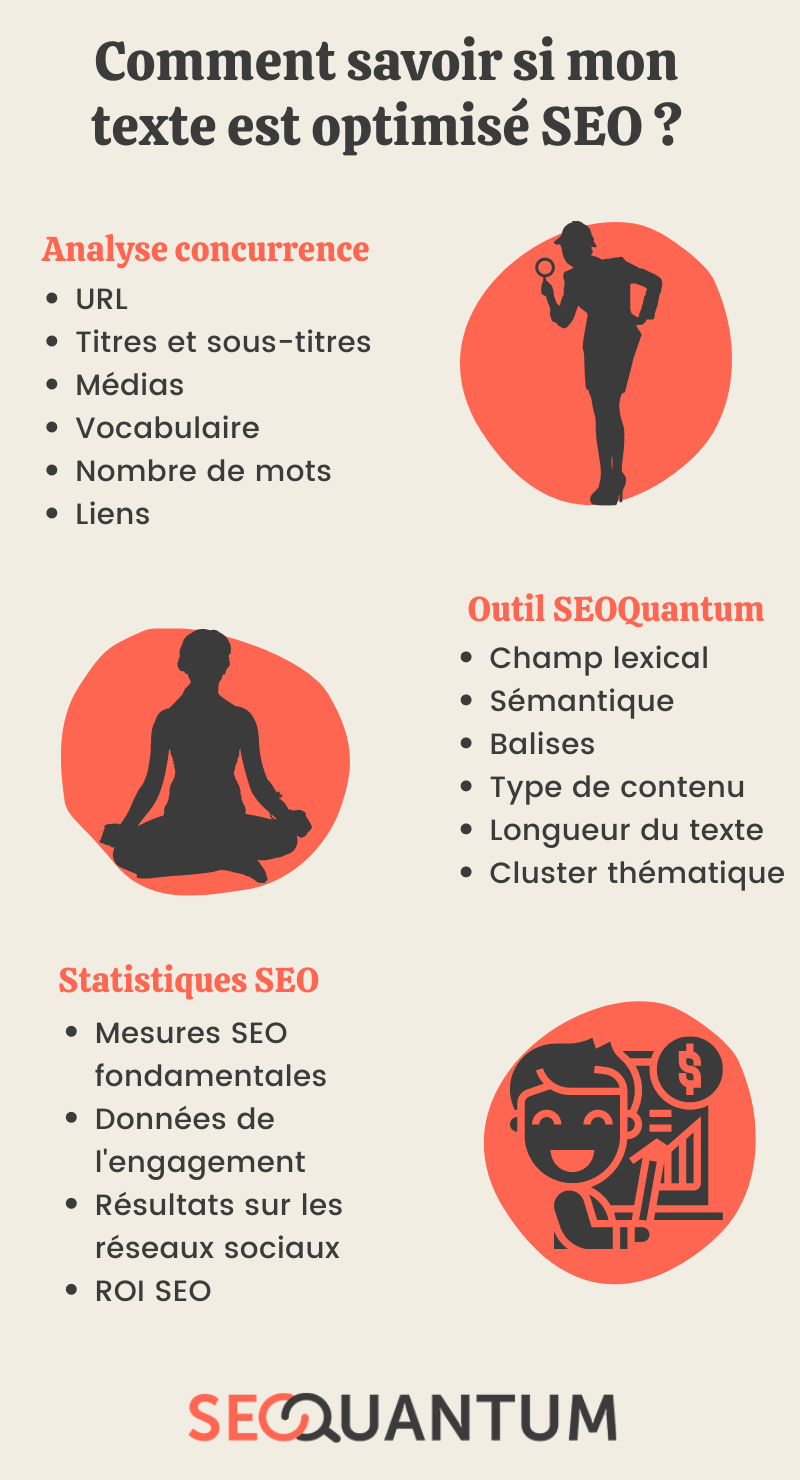
💡 What is an SEO text?
An SEO text (Search Engine Optimization) is content that will make your site visible on search engines (Google, Bing, etc.). To optimize your writing, it is essential to know how search algorithms work and the best practices to implement (as well as the things not to do!). Here are some articles that could be useful for understanding this topic:
- Checklist for on-page and off-page SEO (technical, content, and external links);
- Google EAT criteria: why is it so important for SEO?
Moreover, an SEO text must meet the needs of users, both in terms of content and presentation. Thus, you structure the information transmitted clearly and effectively, with the aim of facilitating reading on digital devices and retaining your readership. If you are not sure you master this topic, I invite you to read the following writing guides:
- Content and SEO optimization: the complete guide for SEO professionals;
- Web copywriter: what are the online training courses?
When writing for your website, you should always keep these two objectives in mind. This will allow you to attract quality organic traffic and, consequently, monetize your investment and increase your revenue. In the rest of this post, I will show you how to know if your text is SEO optimized, whether before or after publication.
🔎 How to know if my text is SEO optimized before publishing it?
Before publishing your SEO content, you can already check many data points. By analyzing what has already been written on the subject and using a powerful tool, you will know if you still need to improve the SEO optimization of your text before putting it online on your website.
Comparison with the competition

An SEO competition analysis is crucial for understanding search engine expectations in your field of activity. By drawing inspiration from the most visible sites, you can refine your content to match the Google ranking criteria that best suit your theme.
Visual check
- URL: check if the page address contains the key query, if stop words have been removed, and if other information appears (category, date, etc.).
- Titles and subtitles: skim the content to understand the general structure of the text and the topics covered.
- Media: draw inspiration from the media offered by the best-ranked texts (images, infographics, screenshots, GIFs, podcasts, and videos).
In-depth check
- Vocabulary used: by quickly reading the text, you will likely find expressions and synonyms that you forgot to include in your SEO content.
- Word count: copy and paste competitor texts to discover the approximate length that allows for a comprehensive treatment of the subject.
- Internal links: look at how the internal linking has been optimized and what types of pages the links redirect to.
- External links: check the destination pages of outgoing links and the relevance of the sites offered to complement the information.
Using SEOQuantum's optimization tool
With the SEOQuantum tool, you get a wealth of data at a glance that allows you to check the SEO optimization score of your text. In addition to the competition analysis, you have all the information you need to write a good SEO text. To illustrate my point, I will decipher the statistics of an SEO text example: https://www.seoquantum.com/billet/exemple-article-seo.
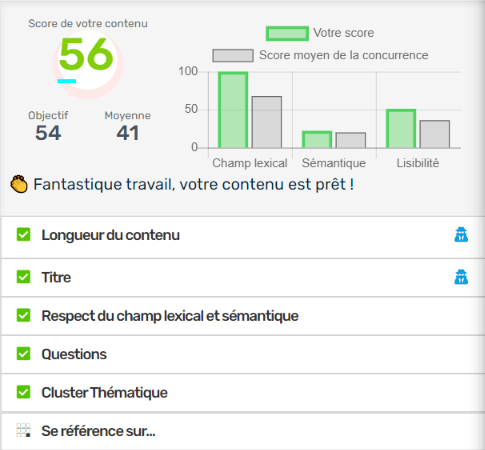
Content length
The tool automatically calculates the length of content displayed on the first pages of Google search results. Thus, you have a good understanding of the number of words you should write for your text to be well optimized. This saves you considerable time compared to the manual analysis previously proposed in this article.
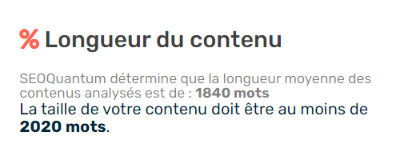
Titles
The tool checks if the important keywords are in your title (H1) and your title tag (H). Moreover, even before writing your content, you have suggestions for words to include in these essential areas for SEO optimization of your text.
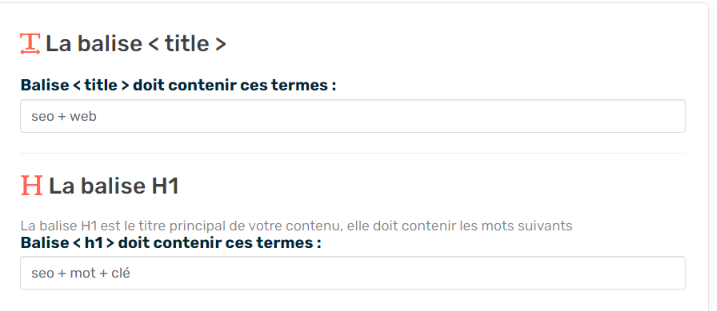
Compliance with lexical and semantic fields
You probably know that to optimize the SEO of your text, you need to use a rich vocabulary that corresponds to the subject you are writing about. The SEOQuantum tool analyzes your content and offers you a lexical and semantic field to improve the ranking of your content.
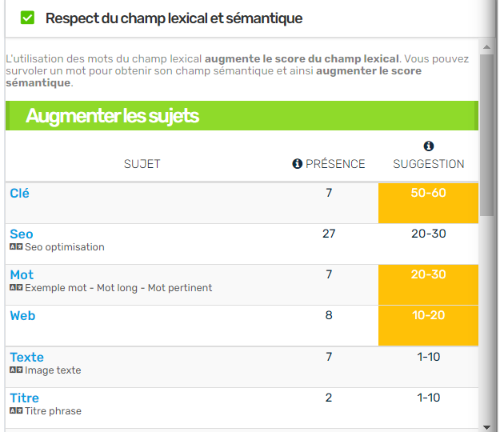
Content type
Meeting the search intent is something you should always consider when writing a text for your website. Thus, you respond coherently to users' questions and search engine expectations. The SEOQuantum tool makes your job easier by clearly telling you the type of content you should write.
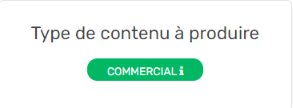
If you want to know exactly how our SEO tool works, I invite you to read the following article: How does SEOQuantum measure the relevance of your content?
📊 How to know if my text is SEO optimized after publishing it?

To know how my text is optimized for SEO, I check all the data I have at my disposal. I usually do this two or three months after publication, because, as you know, organic ranking can take time.
To conduct this study, you can use the following SEO tools:
Here are the points I suggest you check to know if your optimization work is effective.
Fundamental SEO measurements
At the beginning of your analysis, I suggest you look at the data that gives you a direct overview of the SEO optimization of your text. Here are at least the 4 elements you should absolutely check:
- Keyword positioning: have you reached the first page of Google for the main query? What are the secondary keywords you are visible for?
- Organic traffic: be sure to separate traffic coming directly from search engines from that coming from social networks or direct connections.
- Click-through rate (CTR): are users interested in your content when they see it in the SERP?
- Mentions and backlinks: have other sites mentioned your SEO text or, even better, created a link pointing to your page?
Site engagement data
Understanding the behavior of your audience is also an interesting factor in determining the quality of your SEO text. I therefore suggest you delve deeper into your page analysis by checking the following 4 points:
- New visitors: does your text interest new readers?
- Interaction with content: are the links you placed relevant? Do you have comments? Is your text shared?
- Bounce rate: how much time do your readers spend on this page of your website?
- Conversion rate: have you managed to convert your reader into a prospect, or your prospect into a customer?
Social media results
The signals you can analyze on social media are also good indicators of the quality of your text. The advantage of this analysis is that it can be done even before your page is indexed on Google. Once your content is shared, don't hesitate to check the following 3 pieces of information:
- People reached: what is the audience that your publication could potentially interest?
- Interactions: does your message appeal to your audience (likes, shares, clicks on links or your profile, etc.)?
- Acquisition: has your audience increased since your publication (followers, newsletter sign-ups, contact requests, etc.)?
Content profitability
This is, of course, the ultimate goal of your SEO content writing: the acquisition of new customers and the sale of your services or products! By combining all the data collected in your previous analyses, you can then calculate the profitability of your investment. This way, you will be able to adjust your next actions based on the performance of your content and improve your ROI in the long term.
If you want to delve deeper into this aspect of content marketing, I suggest you read this other post: Calculating ROI, what for?
Do you have other methods for knowing when your text is well optimized for organic ranking? Do you know of other tools that help you improve your SEO content?
This technique I use to know if my text is SEO optimized has the advantage of providing me with information before publication (competition analysis and use of our tool), a few days after the page goes live (social networks), and three months later (SEO data check). This way, I can make the necessary updates as I go along to improve the visibility and profitability of my site.
Of course, only experience allows for perfecting SEO actions. In fact, I invite you to read this article where I share 8 SEO mistakes to avoid to make your content effective.
Need to go further?
If you need to delve deeper into the topic, the editorial team recommends the following 5 contents:

